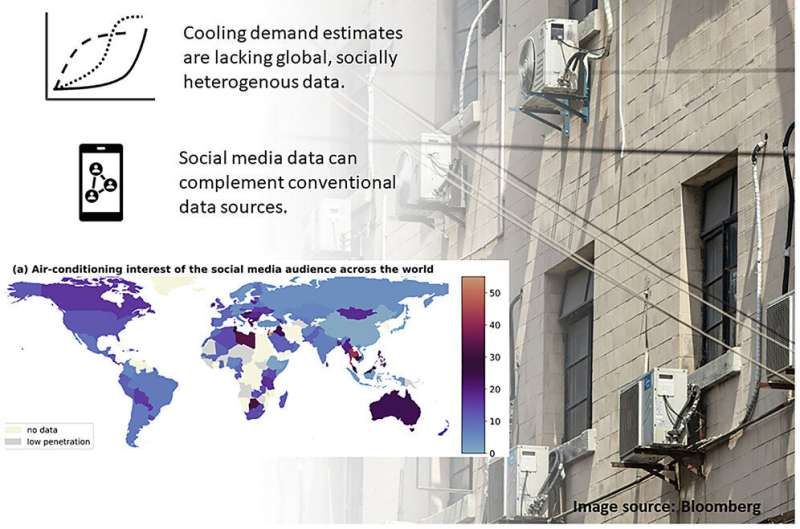Social media data provides first glimpse at increased popularity of air conditioning worldwide

With temperatures rising worldwide, more and more people globally consider air-conditioning an essential element of living with climate change. However, air-conditioning units are also rather power-hungry and are likely to increase energy consumption in areas where they are used often. To limit the impact of air-conditioners on our energy grids and our climate, we need data to better understand where they’re sold globally.
That’s quite a struggle in regions where that data is not available. However, through social media advertising data, we get a first glimpse of what drives and motivates people to buy air-conditioners worldwide, new research led by Sibel Eker from Radboud University shows. The research is published in One Earth today.
Though it seems obvious that many people will invest in air-conditioning (AC) units as a way to reduce the heat in their home, there is no concrete way of knowing exactly how many people will invest in them in the future.
“We have some data on how many households own an AC unit in Western countries, and what types of people buy them. But we don’t know have a good view on what’s happening around the world in regions such as Asia and Africa,” explains Sibel Eker, assistant professor of system dynamics at Radboud University.
“That’s an issue, as the lack of these units implies a high heat vulnerability, and as these units often increase carbon emissions and lead to higher energy consumption in certain areas. As such, we decided to look at data from social media to see if that provides some indication of interest and purchasing levels in those areas.”
“The data we looked at shows that, on a global level, middle aged, highly educated, married, or cohabiting males, as well as parents of small children, tend to express more online interest in AC units,” explains Sibel.
“Regions such as the Balkans and Middle East, regions that are increasingly vulnerable to rising temperatures and heatwaves, show the highest online interest in AC. In those countries, population groups that have been known to be reluctant to adopt to AC, such as the elderly, show a relatively high online interest in AC. That indicates that their attitude might be changing, and we might see a higher adoption of AC units in those regions than we have in the past.”
Worldwide data from social media
The researchers used data from Facebook and Instagram across 113 countries. “This data tells us which types of people are shown advertisements related to purchasing air conditioning, and how many of them actually decided to install one or more units. We looked at data on age, relationship status and parenthood to get an idea of what types of people are more likely or less likely to purchase an AC,” explains Eker.
“Conventional data sources such as household surveys are accurate, yet costly and context-dependent, for instance limited to a few countries. By using social media data, we were able to complement conventional data sources in improving our understanding of the extent and drivers of AC adoption at a global level. This provides valuable data to researchers and other organizations worldwide, in understanding how climate change might be increasing the adoption of AC units in new regions and among different groups of people.”
More information:
Sibel Eker et al, Social media data shed light on air-conditioning interest of heat-vulnerable regions and sociodemographic groups, One Earth (2023). DOI: 10.1016/j.oneear.2023.03.011
Citation:
Social media data provides first glimpse at increased popularity of air conditioning worldwide (2023, April 21)
retrieved 21 April 2023
from https://phys.org/news/2023-04-social-media-glimpse-popularity-air.html
This document is subject to copyright. Apart from any fair dealing for the purpose of private study or research, no
part may be reproduced without the written permission. The content is provided for information purposes only.
For all the latest Science News Click Here
For the latest news and updates, follow us on Google News.

